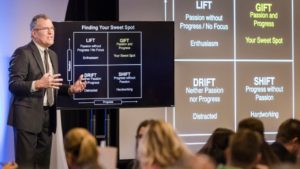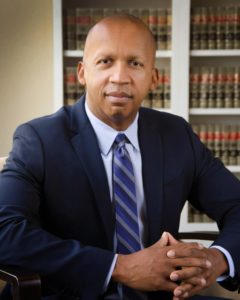
Pastor Bill Mitchell traded a successful career in real estate for a spiritual mission. Boca is benefitting from his wisdom.
I’ve become a huge fan of Boca Lead, the monthly speaker series hosted by Pastor Bill Mitchell at Boca Raton Community Church.
Every month, 400 plus people gather to hear a positive message designed to help them live a better life, run a better business and build a better Boca. The demand is so strong that Boca Lead added a dinner series with a debut last week that attracted more than 200 people.
It’s an inclusive group—all faiths are made to feel welcome—and the message is not only smart it’s extremely relevant. My good friend Karen Granger turned me onto the series when she invited me to sit with her colleagues at 4 Kids. I owe her a debt of gratitude, because Boca Lead has become an important part of my month.
As a result of Karen’s intro, our company is buying a table most months so we can be inspired to lead, mentor and build a better community. We all have a role in making that happen.
In its 5 year existence, Boca Lead has attracted over 5,500 different people to the monthly talks and now with dinner sessions the audience is sure to grow and deservedly so, because in a word it’s awesome. And we desperately need to apply the lessons being taught every month.
I’ve gotten to know Pastor Mitchell since attending my first Boca Lead and I’m incredibly impressed by his insights, devotion to the community and his work across the globe. He and his wife, Elizabeth, are remarkable people and talented communicators. The ability to command a room month after month—to inspire, motivate and get us to stop our busy lives so that we may focus on what’s really important is truly something special to witness.
Every month, I don’t think he can top the prior month, but he seems to do so.
This month was no exception.
The title of the talk was “Drifting” which will soon be an e-book. I just finished “Shifting” another e-book by Pastor Mitchell that I found riveting. Again, the message is universal and this Jewish guy from New York can relate to the insights and better yet, can apply the principles to my life and business.
Drifting talked about how distractions, a lack of integrity and another assorted noise lead us astray.
The talk ended with four suggestions for building community—a subject I have been passionate about for as long as I can remember. A sense of community attracted me to Delray Beach, pushed me into a stint in public service and has kept me engaged since moving to Florida in 1987.
Pastor Mitchell posited that in order to build community you need four elements:
Proximity—you can’t build community from afar, people need to be brought together. But that’s just a start. We can all live in the same neighborhood, work at the same company or attend the same school but if we don’t mix we can’t build community. So proximity is a must, but it’s just a start.
Hospitality—is necessary to build community. We need to break bread with people, extend them courtesies, and invite them into our homes and lives if we are to grow close.
Relationship—we need to work on building relationships with our neighbors in order to build community. It’s not enough to just wave hello, we need to work on forging real relationships.
Peacemaking—this one fascinating. It’s not peacekeeping, it’s the ability to make peace not the ability to keep people from hurting each other. This is so important in a community. It struck me that we are lacking peacemakers in our world today and in our local communities too.
As Pastor Mitchell walked us through the list, a thought crossed my mind.
Social media—which pretends to build community does not possess any of the four community building blocks.
It’s not proximate, you can sit in your pajamas and spew venom on Twitter without ever having to face the target of your wrath, there’s no means of providing real hospitality other than maybe sending an emoji, social media doesn’t really foster real relationships beyond a post here and a reply there and finally social media does not seem to have any mechanism for peacemaking. People start a lot of wars on Facebook, but I have yet to see them make peace.
Now admittedly, I am a social media user. I enjoy Facebook for allowing me to share photos of my dogs and stay in touch with old friends and classmates. But I don’t enjoy seeing the posts about my town that seek to divide, label and malign. There are a whole lot of them, entire pages devoted to ripping the town apart.
Truth be told, I think it has harmed our sense of community and nearly destroyed civic pride. That’s a lot of damage to overcome.
We are not the only city that has suffered this fate and the fact is America is incredibly and maybe hopelessly divided at this point in our history. It’s a sad time, it really is.
I don’t see how this ends or how we can magically unwind some of the abhorrent behavior we’ve all witnessed.
But there was a time, it now seems so long ago, when I and many others viewed Delray Beach as an oasis in a desert. A place where you always felt the best was yet to come and that every problem could be solved.
Please don’t tell me it didn’t exist, because I experienced it and so have others. I have witnesses and these days most of them shake their heads when you mention the current state of affairs.
That doesn’t mean that we were conflict free, we surely weren’t.
Worthing Place, Atlantic Plaza part 1, the Jerrod Miller shooting—and on and on the list goes. There was a time when African Americans could not safely cross Swinton and couldn’t use the public beach but….despite those serious challenges there was this feeling that we could work things out, that we could and would somehow find a way forward even in the face of tragedy.
When I think back on how past controversies resolved themselves, I see Pastor Mitchell’s four pillars of community building come to life. Differences were solved because people got together, built relationships, extended hospitality and made peace.
C. Spencer Pompey was a peacemaker extraordinaire.
He knew the power of relationships and hospitality and so he got people together and eventually we opened up our beaches.
We were bitterly divided over development after Worthing Place so we got together and worked on a Downtown Master Plan.
When a developer wanted to put 10 pounds of you know what in a five pound bag on Atlantic Plaza, the city commission brought in designers and the community to try and find a plan that everyone could embrace.
Sometimes the efforts produce solutions (Mr. Pompey succeeded) and sometimes they fall short (the developer walked away from the plan the designers and community produced) but the effort always seemed to matter. You were extended credit for trying. You built relationships by coming to the table and working on issues large and small.
This kind of peacemaking doesn’t seem to be happening online and it’s destroying us—rapidly.
I’ve been going through old files in a sometimes futile effort to de-clutter my life.
I recently stumbled across a flier called the Atlantic Gazette that absolutely ripped me and some of my friends to shreds. It was anonymous and really ugly. You get these things when you are in public life or even if you just venture an opinion or an idea. I guess it comes with the territory.
When I was young and new to the game, I would cringe at this stuff. But I learned that despite the best efforts of critics, most people never saw the fliers, email blasts or in one case the banner flown over the beach.
Life went on, the people who know you laugh it off, the critics tell their friends “see, I told you so” and soon it’s on to the next subject.
But today, social media is ubiquitous. It’s hard to avoid the toxicity.
Joni Mitchell urged us to get “back to the garden” in her classic song Woodstock.
Pastor Mitchell reminds us that we need to get back to proximity, relationships, hospitality and peacemaking before it is too late.
Can we?
Will we?
What if we don’t?
For more information on Boca Lead. To view past talks (highly recommended) and for ticket information please visit https://www.bocalead.com
